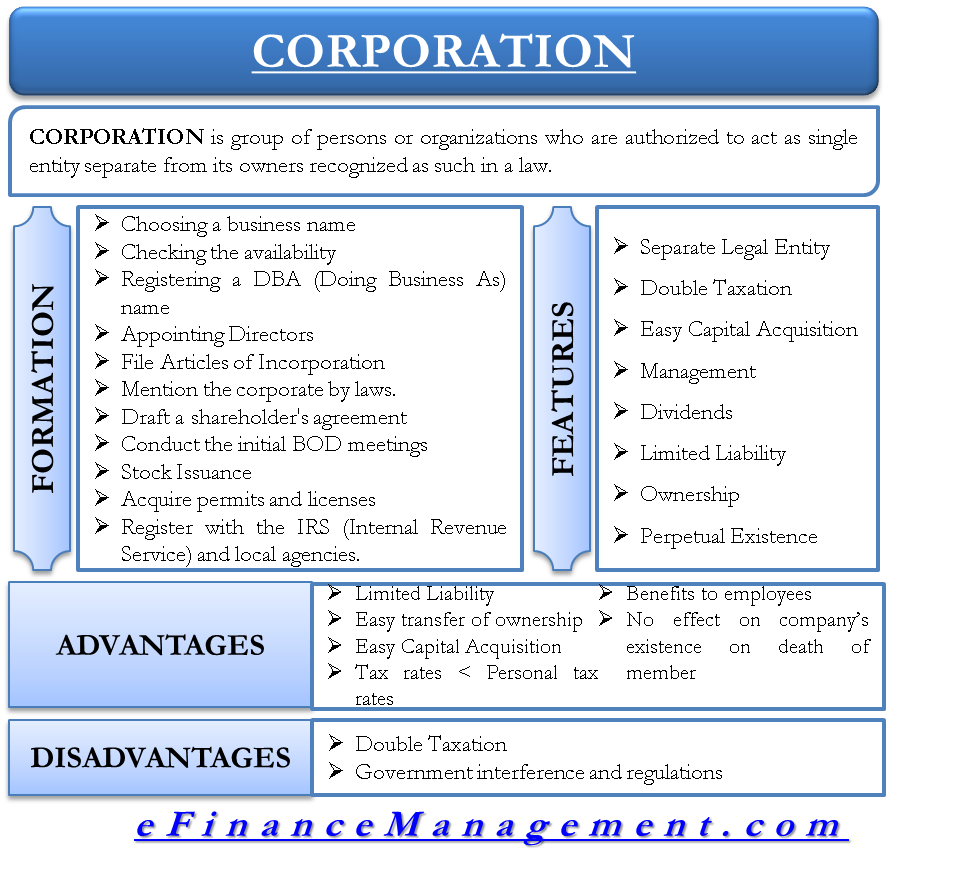A corporation is a group of people or organizations who are authorized to form a single legal entity separate from its owner. It does all those things that one individual can do. For instance, enter into contracts, sue or can be sued, purchase or sell something. Also, it can borrow money, pay taxes, hire employees, etc. Hence it carries a limited liability, i.e., the shareholders carry a liability to the extent they own their shares in the corporation. So they don’t need to pay from their pockets. There are various forms of business. But a corporation can be for-profit or not-for-profit. And can be publicly or privately held.
The jurisdiction divides a company into two kinds: whether or not it can issue stock and whether or not it is profit-oriented. Further, we divide the companies based on the number of owners: corporation aggregate and a corporation sole. The Corporation sole has a single incorporated office consisting of a single natural person only. But corporation aggregate is our subject matter today.
Types of Corporation
C Corporation
C corporation is those corporations as per United States Federal Income Tax Law which is taxed as per the Subchapter C of the Internal Revenue Code. So, it pays taxes out of the earnings as a separate legal entity before distributing the dividends to the shareholders.
S Corporation
S corporations are those corporations under Subchapter S of the Internal Revenue Code as per United States Federal Income Tax Law who meet certain federal requirements. The corporation does not pay the taxes as a corporation but distributes them to the shareholders. Hence, the shareholders pay taxes on their tax returns at their tax rates.
Also Read: C Corporation Vs S Corporation
Read C Corporation Vs. S Corporation for more details.
Formation
The following is the step by step procedure for the formation of the corporation:
- Choosing a business name.
- Checking the availability.
- Registering a DBA (Doing Business As) name.
- Appointing Directors.
- File Articles of Incorporation.
- Mention the corporate bylaws.
- Draft a shareholder’s agreement.
- Conduct the initial BOD (Board Of Directors) meeting.
- Stock Issuance.
- Acquire permits and licenses.
- Register with the IRS (Internal Revenue Service) and local agencies.
Generally, corporations are formed in the state where they operate their business. But it is not necessary to do that.

Features
Separate Legal Entity
It has a separate legal entity completely different from its owners. So, it carries various rights and responsibilities.
Double Taxation
It pays taxes on profits like any other business organization. If the corporation pays a dividend to the shareholders, they also need to pay taxes on those dividends. This amounts to double taxation.
Easy Capital Acquisition
Management
Shareholders don’t take care of day-to-day operations. They hire the Board of Directors, who then hire employees. These employees work
Dividends
Limited Liability
The shareholders carry a limited liability to the extent of their investment in the corp. They are not personally liable to pay any obligations from their own pockets. Creditors cannot seek shareholders’ assets to claim their debts.
Ownership
The ownership is easily transferable from one shareholder to another.
Perpetual Existence
It doesn’t get affected by the death, inability, or insolvency of any person. Even though the country’s charter may provide some time limit for the existence of the company, so, it may continue to operate if the time limit extends.
Advantages & Disadvantages of Corporation
The followings are the advantages and disadvantages of a corporation:
Advantages of a Corporation
- The great advantage is that there is liability protection for the shareholders.
- There is an easy transfer of ownership.
- Capital acquisition is easy.
- If someone dies, is disabled, or becomes insolvent, there is no effect on the company.
- The corporate tax rates are comparatively lower than the personal income tax rates.
- It provides various benefits to the employees. Some of them are tax-deductible for the employees.
Disadvantages of a Corporation
- The major disadvantage is double taxation. So, Sometimes there are chances we end up paying double tax.
- There are some government regulations. Hence, it is not easy to establish it.
Frequently Asked Questions (FAQs)
A for-profit corporation operates with the primary goal of generating profits for its owners or shareholders. A not-for-profit corporation, on the other hand, focuses on achieving a specific social, charitable, or public purpose rather than generating profits.
Also Read: C Corporation
Corporations can be categorized as C Corporations and S Corporations based on their tax treatment. C Corporations are taxed at the corporate level before distributing dividends to shareholders, potentially leading to double taxation. S Corporations pass through their income to shareholders, who then pay taxes on their individual tax returns.
Ownership in a corporation is represented by shares of stock. These shares can be easily transferred from one shareholder to another, allowing for changes in ownership without affecting the company’s operations.
Continue reading – Unincorporated Association.


Hello Sanjay Happy New Year! Thank You for this great website it’s awesome!